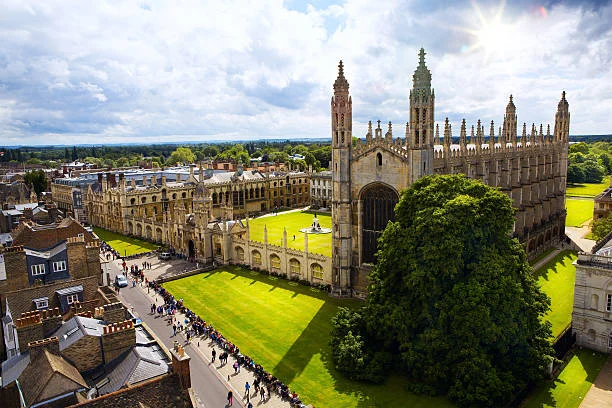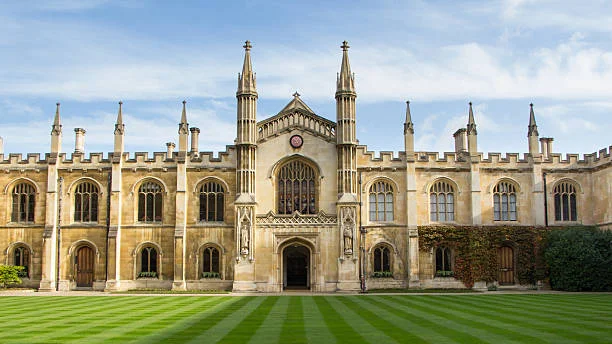
Table of Contents
The University of Cambridge, situated in Cambridge, England, is among the world’s top-ranking universities, renowned for its academic excellence, powerful research, and historic significance. Founded in 1209, Cambridge has been a hotbed of innovation at all times, churning out some of the world’s greatest minds in sciences, literature, and politics.
University of Cambridge History:
Established in the early 13th century by academics who departed from Oxford, Cambridge soon became a prominent seat of learning. The collegiate system of the university, with 31 independent colleges, evolved over the centuries, creating a distinctive atmosphere of learning. Some of the highlights are the establishment of the Cambridge University Press in 1534 and the Cavendish Laboratory in 1874, where pioneering scientific breakthroughs were achieved.
Global Rankings
- Cambridge is always one of the world’s top universities:
- QS World University Rankings: Regularly in the top 3 globally.
- Times Higher Education (THE) Rankings: Regularly in the top 5.
- U.S. News & World Report: Best university in Europe and in the world.
- These rankings indicate Cambridge’s standing for academic quality, world-class teachers, and influential research outputs.
Academic Programs
Cambridge has a diverse array of undergraduate and postgraduate programs across six schools:
- Arts and Humanities – Literature, history, philosophy, and languages.
- Biological Sciences – Genetics, neuroscience, zoology, and ecology.
- Clinical Medicine – Medicine, public health, and biomedical sciences.
- Humanities and Social Sciences – Economics, politics, law, and sociology.
- Physical Sciences – Physics, mathematics, chemistry, and earth sciences.
- Technology – Engineering, computer science, and artificial intelligence.
- Cambridge’s tutorial system guarantees individualized instruction, enabling learners to interact in-depth with specialist teaching staff.

Research and Innovation
Cambridge is a world leader in research, with many advances across many fields, including:
- Physics and Astronomy: Advances in quantum mechanics and astrophysics.
- Biomedical Sciences: Groundbreaking genetics, cancer, and vaccine research.
- Artificial Intelligence and Computing: Birthplace of influential AI and machine learning work.
- Climate Science and Sustainability: Pioneering work in environmental science and renewable energy.
- The university partners with industry leaders and government agencies to foster innovation, especially in the Cambridge Science Park, a center for technological start-ups and research centers.
Student Life
Cambridge provides a lively student life with many extracurricular activities, clubs, and societies. With more than 700 student organizations, students can participate in:
- Academic and professional societies.
- Cultural and artistic clubs.
- Sports teams and recreational activities.
- Community service and leadership programs.
- The collegiate system improves student life through the provision of robust support systems and the promotion of close communities within every college.

Athletics and Extracurricular Activities
Sports form an important part of Cambridge’s student life. The university is involved in numerous intercollegiate competitions, with rowing being especially renowned. The Oxford-Cambridge Boat Race, a yearly rowing competition, is among the most renowned sports events globally. Rugby, cricket, and football are other highly popular sports. Also, you can earn money with the transcription job because its one of the easy way to make money online.
Notable Alumni
Cambridge has given rise to some of the world’s greatest influential people, including:
- Scientists: Isaac Newton, Charles Darwin, Stephen Hawking.
- Writers: John Milton, Virginia Woolf, Sylvia Plath.
- World Leaders: Sir Robert Walpole (Britain’s first Prime Minister), Jawaharlal Nehru (India’s first Prime Minister).
- Nobel Laureates: More than 120 Cambridge-associated Nobel Prize winners.
Scholarships and Financial Aid
Cambridge strives to make education available through numerous scholarships and financial aid schemes, such as:
- Gates Cambridge Scholarships: Sponsored by the Bill and Melinda Gates Foundation, for exceptionally talented international students.
- Cambridge Trust Scholarships: For low-income students.
- College-Specific Scholarships: Provided by specific colleges on merit and need basis.
- Government and External Scholarships: Such as Chevening and Commonwealth scholarships. Also, you can earn money with the data entery because its also one of the best online work in industry.
Admission Process
Admission to Cambridge is extremely competitive, with an acceptance rate of approximately 15-20%. The process of selection involves:
- Academic Excellence: Exceptional grades in pertinent subjects.
- Admissions Tests: Subject-specific examinations like the BMAT (medicine) and STEP (mathematics).
- Interviews: Tough interviews to gauge critical thinking and subject knowledge.
- Personal Statement and References: Showing enthusiasm and potential in the chosen area.
The University of Cambridge is still among the world’s best academic institutions, with a reputation for demanding education, innovative research, and powerful alumni. Since its establishment over 800 years ago, Cambridge has continued to influence the world’s knowledge and innovation, making it a suitable place for students aspiring for intellectual and professional excellence.